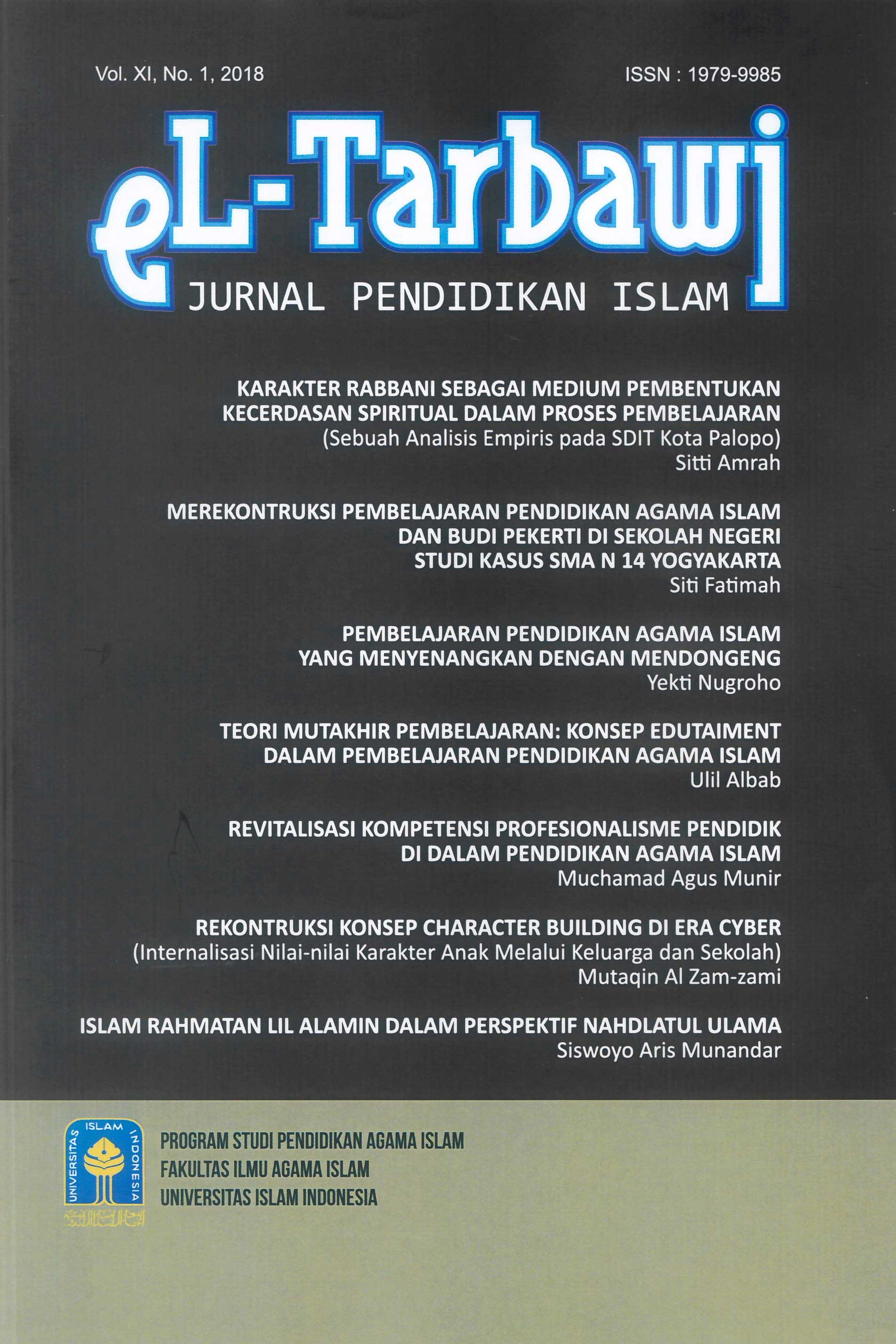Main Article Content
Abstract
Rabbani’s character emphasizes the functionalization of Godliness in the learning process through spiritual values, honesty, sincerity, compassion, tolerance, discipline, hard work, creative, independent, democratic, communicative and prioritizes emphasis on affective aspects (heart). Rabbani character has positive implications for fostering spiritual intelligence in the education process. The purpose of maximizing Rabbani character education in the context of learning is to actualize the potential of spirituality possessed by students, fostering sensitivity and religious responsibility of students through exemplary values, habituation, advice, warnings and punishments. Efforts to apply Rabbani character education in fostering spiritual intelligence can be initiated through the development of religious education curricula, familiarizing Islamic values, creating a cool and beautiful school environment, and applying disciplinary values in the learning process. The method used in the study is descriptive-analytical with interview methods to get maximum results.
Keywords: Rabbani character, spiritual intelligence, religious culture.
Article Details
Authors retain copyright and grant the journal right of first publication with the work simultaneously licensed under a Creative Commons Attribution (CC-BY-SA) 4.0 License that allows others to share the work with an acknowledgment of the work’s authorship and initial publication in this journal.
References
- Ahmad, Abu Husain bin Faris Ibn Zakariyyah, 1972. Mu’jam al-Maqayis al-Lughah, Mesir:Musthafa al-Babi al-Halabiy wa Syarikah.
- Ahmad, Abu Ali ibn Muhammad ibn Ya’qub Ibn Miskawaih, 1398H. Tahzib al-Akhlaq wa Tathir al-A’raq, Cet. II; Beirut : Mansyurah Dar al- Maktabah al-Hayah.
- Amri, Sofan dan Iif Khoiru Ahmadi, 2010. Konstruksi Pengembangan Pembelajaran, Cet.II; Jakarta: Prestasi Pustaka.
- Azizi, A. Qodri. 2003. Melawan Globalisasi: Reinterpretasi Ajaran Isla Cet. I; Yogyakarta: Pustaka Pelajar.
- Azra, Azyumardi. 1999. Pendidikan Islam: Tradisi dan Modernisasi Menuju Milenium Baru, Cet. II; Jakarta: Logos wacana Ilmu.
- , 2002. Paradigma Baru Pendidikan Nasional, Cet. I; Jakarta : Kompas. Barth, Roland S. 2002. Learning by Heart, San Franscisco: Jossey-Bass. Broadbent, Lynne dan Alan Brown, 2002. Issues in Religious Education New York: Routledge Farmer.
- Capra, F. 1994. The Turning Point: Science, Society, and the Rising Culture, New York: Bantam.
- Davidson, Matthew and Thomas Lickona, 2006. “Integrating Excellence and Ethics in Character Education” Jurnal Social Science Docket, Vol. 3, No. 7.
- Giddens, A. 1990. the Consequences of Modernity, Cambridge: Polity Press.
- Goleman, Daniel. 1995. Emotional Intelligence: Why It Can Matter More Than IQ London: Bloomsbury.
- Helmy, Masdar. 2008. Islam Profetik: Substansiasi Nilai-Nilai Agama di Ruang Publik, Cet.I; Yogyakarta: Kanisius.
- Lickona, Thomas dan Kevin Ryan, 1979. Character Development in School and Beyond, Cardinal, Wasington D.C.
- , 1993. “The Return of Character Education,” Journal of Educational Leadership, Vol.3, No.3
- , 2013. Pendidikan Karakter: Panduan Lengkap Mendidik Siswa Menjadi Pintar dan Baik, Cet. I; Bandung: Nusa Media.
- Lubis, M. Solly. 1997. Umat Islam dalam Globalisasi, Cet. I; Jakarta: Gema Insani Press. Muhaimin, 2009. Pengembangan Kurikulum Pendidikan Agama Islam: di Sekolah, Madrasah dan Perguruan Tinggi, Cet. I; Jakarta: Raja Grafindo Persada.
- Muniz, Jose Luis Martinez Lopes, et. al, 2006. Religious Education in Public Schools: Study of Comparative Law, The Netherland: Springer.
- Pasiak, Taufiq. 2003. Revolusi IQ/ EQ/, SQ: Antara Neurosains dan al-Qur’an, Cet. I; Bandung: Mizan.
- Sanjaya, Wina. 2010. Strategi Pembelajaran Berorientasi Standar Proses Pendidikan, Cet. II; Jakarta: Prenada Media Group.
- Sulaiman, Umar. 2017. Korupsi dan Dialektika Kebahagiaan, Cet. I; Kuningan: Nusa Litera Inspirasi.
- Zohar, D dan Ian Marshal, 2000. SQ: Spiritual Intelligence: the Ultimate Intelligence, Great Britain: Bloomsbury.
References
Ahmad, Abu Husain bin Faris Ibn Zakariyyah, 1972. Mu’jam al-Maqayis al-Lughah, Mesir:Musthafa al-Babi al-Halabiy wa Syarikah.
Ahmad, Abu Ali ibn Muhammad ibn Ya’qub Ibn Miskawaih, 1398H. Tahzib al-Akhlaq wa Tathir al-A’raq, Cet. II; Beirut : Mansyurah Dar al- Maktabah al-Hayah.
Amri, Sofan dan Iif Khoiru Ahmadi, 2010. Konstruksi Pengembangan Pembelajaran, Cet.II; Jakarta: Prestasi Pustaka.
Azizi, A. Qodri. 2003. Melawan Globalisasi: Reinterpretasi Ajaran Isla Cet. I; Yogyakarta: Pustaka Pelajar.
Azra, Azyumardi. 1999. Pendidikan Islam: Tradisi dan Modernisasi Menuju Milenium Baru, Cet. II; Jakarta: Logos wacana Ilmu.
, 2002. Paradigma Baru Pendidikan Nasional, Cet. I; Jakarta : Kompas. Barth, Roland S. 2002. Learning by Heart, San Franscisco: Jossey-Bass. Broadbent, Lynne dan Alan Brown, 2002. Issues in Religious Education New York: Routledge Farmer.
Capra, F. 1994. The Turning Point: Science, Society, and the Rising Culture, New York: Bantam.
Davidson, Matthew and Thomas Lickona, 2006. “Integrating Excellence and Ethics in Character Education” Jurnal Social Science Docket, Vol. 3, No. 7.
Giddens, A. 1990. the Consequences of Modernity, Cambridge: Polity Press.
Goleman, Daniel. 1995. Emotional Intelligence: Why It Can Matter More Than IQ London: Bloomsbury.
Helmy, Masdar. 2008. Islam Profetik: Substansiasi Nilai-Nilai Agama di Ruang Publik, Cet.I; Yogyakarta: Kanisius.
Lickona, Thomas dan Kevin Ryan, 1979. Character Development in School and Beyond, Cardinal, Wasington D.C.
, 1993. “The Return of Character Education,” Journal of Educational Leadership, Vol.3, No.3
, 2013. Pendidikan Karakter: Panduan Lengkap Mendidik Siswa Menjadi Pintar dan Baik, Cet. I; Bandung: Nusa Media.
Lubis, M. Solly. 1997. Umat Islam dalam Globalisasi, Cet. I; Jakarta: Gema Insani Press. Muhaimin, 2009. Pengembangan Kurikulum Pendidikan Agama Islam: di Sekolah, Madrasah dan Perguruan Tinggi, Cet. I; Jakarta: Raja Grafindo Persada.
Muniz, Jose Luis Martinez Lopes, et. al, 2006. Religious Education in Public Schools: Study of Comparative Law, The Netherland: Springer.
Pasiak, Taufiq. 2003. Revolusi IQ/ EQ/, SQ: Antara Neurosains dan al-Qur’an, Cet. I; Bandung: Mizan.
Sanjaya, Wina. 2010. Strategi Pembelajaran Berorientasi Standar Proses Pendidikan, Cet. II; Jakarta: Prenada Media Group.
Sulaiman, Umar. 2017. Korupsi dan Dialektika Kebahagiaan, Cet. I; Kuningan: Nusa Litera Inspirasi.
Zohar, D dan Ian Marshal, 2000. SQ: Spiritual Intelligence: the Ultimate Intelligence, Great Britain: Bloomsbury.
